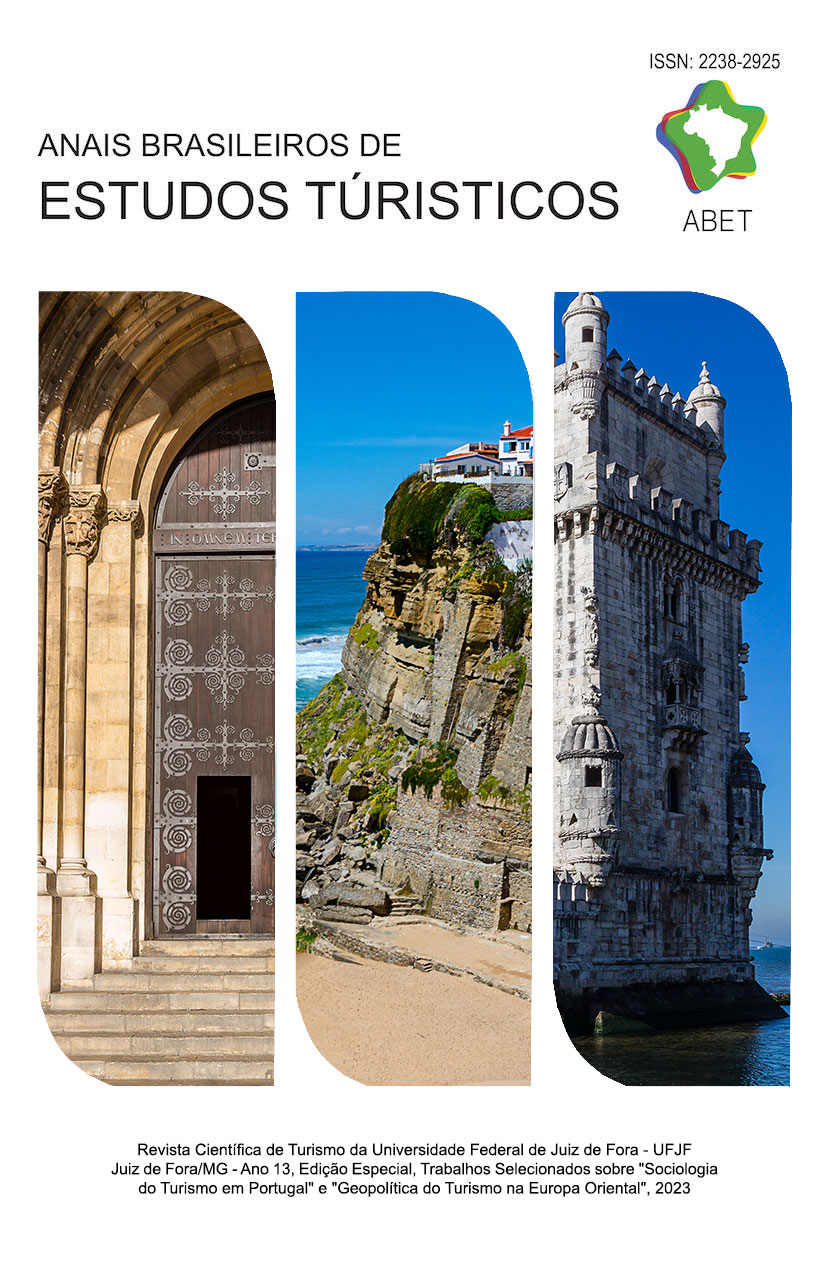Body, tourisms, resonances
DOI:
https://doi.org/10.5281/zenodo.10414631Keywords:
Autenticity, Ethics, Merleau-Ponty, ResonanceAbstract
The objective of this essay is to present an ongoing reflection on the human body as an interface of the tourist experience. Starting from a model of Philosophical Anthropology that sees the human as a unitary being, and focusing on the phenomenology of Maurice Merleau-Ponty, we radically observe how the factors body, space, time and intentionality shape the tourist experience, fostering a deep sense of unison with the environment and of care and ethical consideration for all living things. Such reflections are an invitation to reformulate our current way of seeing and being tourism, making it more sensitive and ethically valid in its ontic and methodological approaches.
Downloads
References
André, J. (1999). Pensamento e afectividade. Coimbra: Quarteto Editora.
André, J. (2021). From an Anthropology of Vulnerability to the Ethics of Care. In J. Braga, M. Santiago Carvalho (eds). Philosophy of Care. New Approaches to Vulnerability, Otherness and Therapy (pp. 19-37). Cham: Springer, https://doi.org/10.1007/978-3-030-75478-5_2
André, J. (2022). Renascimento e Modernidade: Releituras filosóficas. Coimbra: Grácio Editora.
Böhme, G. (1995). Atmosphäre. Essays zur neuen Ästhetik. Frankfurt: Suhrkamp.
Brown, L. (2012). Tourism: A Catalyst For Existential Authenticity, Annals of Tourism Research, 40, 176–190, doi: org/10.1016/j.annals.2012.08.004
Cem (2018). Festival Pedras 18. Lisboa: Cem.
Cohen, E. (1979). A Phenomenology of Tourist Experiences, Sociology, 13, 179-201.
Corbain, A.; Courtine, J.-J. & Vigarello, G. (eds.) (2005a). Historia del Cuerpo. Volumen 1 – Del Renacimiento al Siglo de las Luces. Madrid: Santillana Ediciones Generales.
Corbain, A.; Courtine, J.-J. & Vigarello, G. (eds.) (2005b). Historia del Cuerpo. Volumen 2 – De la Revolución Francesa a la Gran Guerra. Madrid: Santillana Ediciones Generales.
Damásio, A. (2012). Ao encontro de Espinosa. As Emoções Sociais e a Neurologia do Sentir. Lisboa: Círculo de Leitores.
Griffero, T. (2016). Atmospheres. Aesthetics of Emotional Spaces. London: Routledge.
Heidegger, M. (1984). El Ser y el Tiempo. Madrid: Ediciones F.C.E..
Joaquim, G. (2015). Viajantes, Viagens e Turismo Narrativas e Autenticidades. Lisboa: Ed. Mundos Sociais.
Joaquim, G. & Santos, E. (2019). Os Artistas, o Turismo e as Cidades. In Tourfly, Inovação e Futuro: contributos para o desenho da oferta turística na Área Metropolitana de Lisboa (Lisboa-01-0145-Feder-023368), pp. 57-76. Estoril: Eshte.
Laín Entralgo, P. (1997). Sobre la persona. Arbor, 156, 9-24.
Lanfant, M-L (1992). L’Identité em Jeu dans L’Échange Touristique International, Sociologia Urbana e Rurale, 38, 171-178.
Larsen,J.; Urry, J. & Axhausen, K. (2007). Networks and Tourism: Mobile Social Life. Annals of Tourism Research, 324(1), 244-262.
Macbeth, J. (2005). Towards an Ethics Platform for Tourism, Annals of Tourism Research, 32(4), 962-984.
Merleau-Ponty, M. (1981). Phénoménologie de la perception. Paris: Gallimard.
Merleau-Ponty, M. (2001). Le visible et l’ invisible. Paris: Gallimard.
Merleau-Ponty, M. (2003). Palestras. Lisboa: Edições 70.
Nussbaum, M. (2012). Capabilités – comment créer les condition d’un monde plus juste. Paris: Flammarion.
Pelluchon, C. (2018). Éthique de la considération. Paris: Éditions du Seuil.
Rosa, H. (2014). Aliénation et accélération. Une critique sociale du temps. Paris: La découverte.
Rosa, H. (2018). Résonance. Une sociologie de la relation au monde. Paris: La découverte.
Shusterman, R. (2008). Body Consciousness: A philosophy of mindfulness and somaesthetics. Cambridge: Cambridge University Press.
Tribe, J. (2009). Philosophical Issues in Tourism. Bristol: Channel View Publications.
Uriely, N. (2005). The Tourist Experience. Conceptual Developments. Annals of Tourism Research, 3(4), 306-312.
Urry, J. (2011). The Tourist Gaze. Leisure and Travel in Contemporary Societies. London: Sage.
Wang, N. (1999). Rethinking Authenticity in Tourism Experience. Annals of Tourism Research, 26(2), 349-370.
Downloads
Published
How to Cite
Issue
Section
License
Copyright (c) 2023 Anais Brasileiros de Estudos Turísticos

This work is licensed under a Creative Commons Attribution 4.0 International License.
This journal provides immediate open access to its content, following the principle that providing free scientific knowledge to the public provides greater democratization of world knowledge.
Authors must agree to the following terms relating to copyrights:
(a) Authors keep all copyright and grant the to the journal the right of first publication, with the work simultaneously licensed under the Creative Commons Attribution License that allowing job sharing with recognition of authorship of the work and initial publication in this journal.
(b) Authors are allowed to assume additional contracts separately, for non-exclusive distribution of the version of the work published in this journal (e.g. publish in institutional repository or book chapter), with recognition of authorship and initial publication in this magazine.
(c) Authors are allowed and are encouraged to publish and distribute their work online (e.g. in institutional repositories or on your personal page) since they do not do this before or during the editorial process, as this can generate productive interchange, as well as increase the impact and citation of work aired. (See Effect of Free Access).















